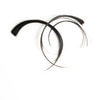|
We don't always think of derms as hair experts, but they are the professionals to see for things like dandruff and hair thinning. As someone who has experienced bilateral eyelash loss (twice), I'm well aware that hair-related ailments can be scary and confusing to navigate. Even seeking everyday good hair health can be something of a mystery. I know my hair goes through phases—often it's thriving, while other times I can see it struggling. But, I can't always pinpoint the habits that yield either result.
To get an expert opinion on the lifestyle changes most likely to promote healthier hair, we reached out to board-certified dermatologist Ainah Tan, MD, FAAD. Tan notes that healthy hair shedding is approximately 100 to 150 hairs a day and, with that, you can expect to see about a half-inch per month of growth. But as you get older, your rate of growth slows (and you have to step up your care routine if you want to keep your hair, brows, and lashes in optimum health). "Hair loss and thinning is an extremely frustrating issue and can be difficult to treat, as the cause can be difficult to determine," notes Tan. Whether you're trying to turn hair loss around or simply want your strands to look, feel, and be their best, here are the dermatologist-approved ways to improve your hair health today. Eat clean When it comes to hair, you are what you eat. A nutrient-dense diet will greatly improve the health of hair follicles, giving you shinier strands. "Make sure that you are eating a healthy diet including lots of leafy vegetables and sources of iron," advises Tan. "Both iron and vitamin D help build and strengthen hair. This is why these ingredients are so often found in hair supplements." Stay on top of your health When your body is out of whack, it can show in your hair. "It is important to also make sure that the rest of your body is in working order and to regularly visit your doctor for a check-up," reminds Tan. "They can check things like your thyroid stimulating hormone (TSH), as thyroid dysfunction can be a reason for dull or thinning hair." Keep your stress in check "Minimize stress as much as possible," advises Tan. "Stress can affect the body immensely. When your mind and body are stressed, energy is diverted from making lush, thick hair." Additionally, Tan notes that stressful events such as delivering a baby, being hospitalized, or dealing with a death in the family can trigger a type of hair loss called telogen effluvium. "But don’t worry, once the stress is decreased and life starts getting back to normal, hair growth typically returns to a healthy state," assures Tan. Keep products and heat to a minimum Overworking your hair with daily styling and product buildup can eventually take its toll on the health of your strands and scalp. "Minimize the use of products and hair care practices that can damage the hair cuticle, especially those that use heat," warns Tan. This includes but isn't limited to blow drying and styling with hot tools. "These practices induce bubbles and breaks in the hair that can decrease luster and actually cause hair breakage," says Tan. Listen to your hair An important thing to remember is that everyone's hair and scalp are different. What works for your friend might not be the best option for you. Pay attention to how your own hair reacts to products, practices, and haircare routines. Then, adjust accordingly. Tan reminds that it's okay to wash your hair daily. "Increased frequency of hair washing does not cause increased hair loss," she clarifies. "Everyone’s scalp is different and has different washing needs." Do what works for you. Try keratin Keratin isn't just for smoothing, it can actually give your hair a boost to make your strands more resilient. Tan notes that hair salon keratin treatments and hair care lines such as Nioxin "can help thicken hair and improve its appearance." When in doubt, see a derm "If you are getting distinct patches of hair loss, I would recommend seeing a board-certified dermatologist to diagnose and treat your hair loss, as there may be an autoimmune cause, such as alopecia areata," says Tan. Sometimes, hair loss is hereditary and runs in the family. "This is called androgenetic alopecia (hormonal and genetic hair loss)," explains Tan. She says that this typically presents with thinning all over the scalp, but is usually most prominent on the top and sides of your scalp. Tan notes that there are a variety of treatment options including topical medications (Rogaine), vitamin supplementation (Viviscal, Nutrafol), oral medications (spironolactone, finasteride, dutasteride), and even procedures (injections of platelet-rich plasma, hair transplantation) that can help. "Make sure to see a board certified dermatologist to discuss your options," she recommends. This article is from Byrdie Hair by Brian - The Beauty Blog
Comments are closed.
|
Hair by BrianMy name is Brian and I help people confidently take on the world. CategoriesAll Advice Announcement Awards Balayage Barbering Beach Waves Beauty News Book Now Brazilian Treatment Clients Cool Facts COVID 19 Health COVID 19 Update Curlies EGift Card Films Follically Challenged Gossip Grooming Hair Care Haircolor Haircut Hair Facts Hair History Hair Loss Hair Styling Hair Tips Hair Tools Health Health And Safety Healthy Hair Highlights Holidays Humor Mens Hair Men's Long Hair Newsletter Ombre Policies Procedures Press Release Previous Blog Privacy Policy Product Knowledge Product Reviews Promotions Read Your Labels Recommendations Reviews Scalp Health Science Services Smoothing Treatments Social Media Summer Hair Tips Textured Hair Thinning Hair Travel Tips Trending Wellness Womens Hair Archives
April 2025
|
|
Hey...
Your Mom Called! Book today! |
Sunday: 11am-5pm
Monday: 11am-6pm Tuesday: 10am - 6pm Wednesday: 10am - 6pm Thursday: By Appointment Friday: By Appointment Saturday: By Appointment |


 RSS Feed
RSS Feed